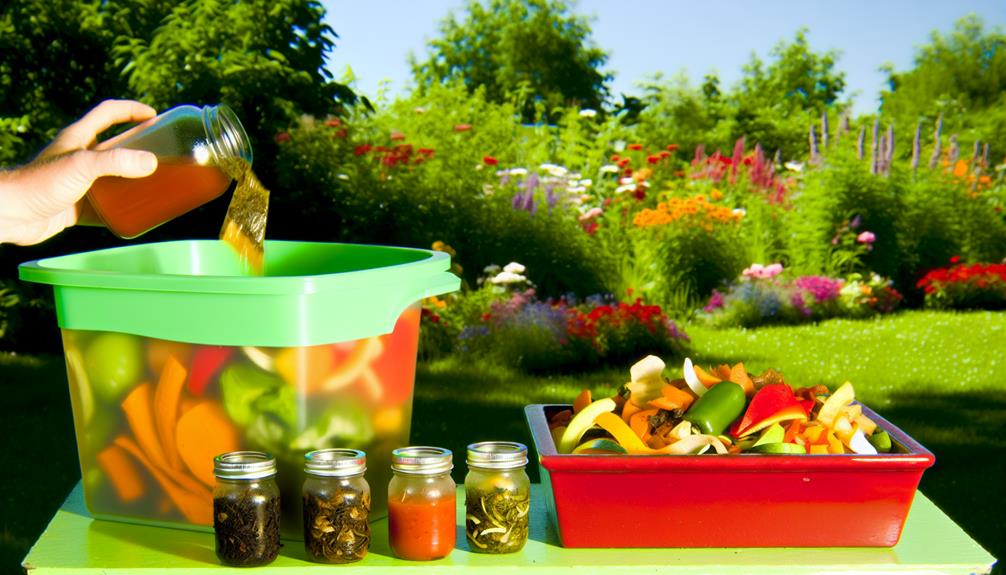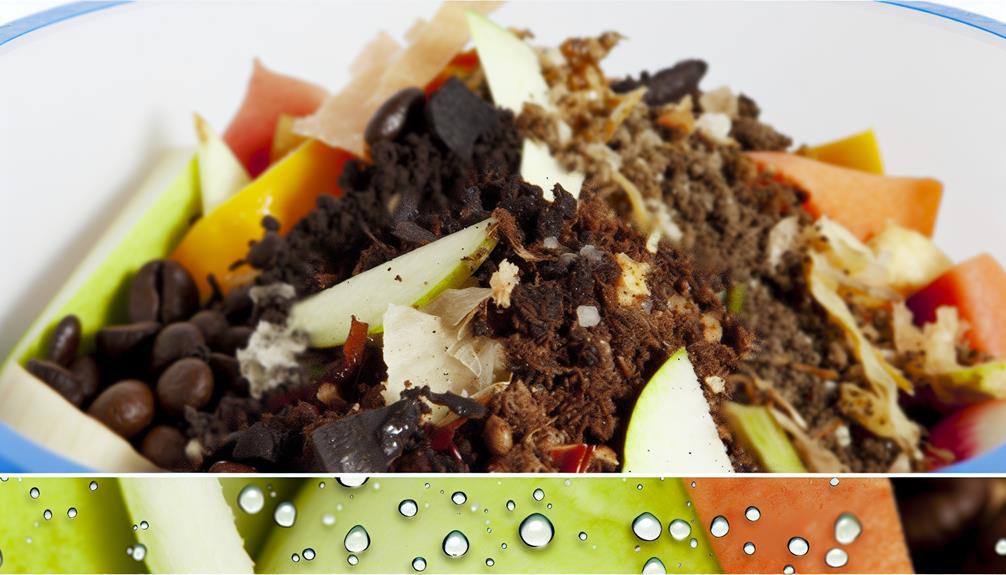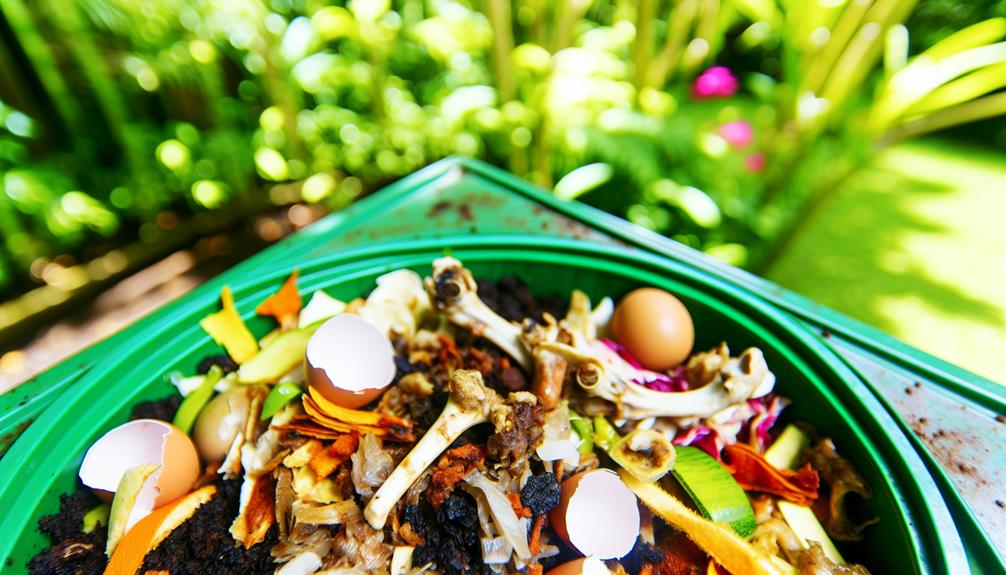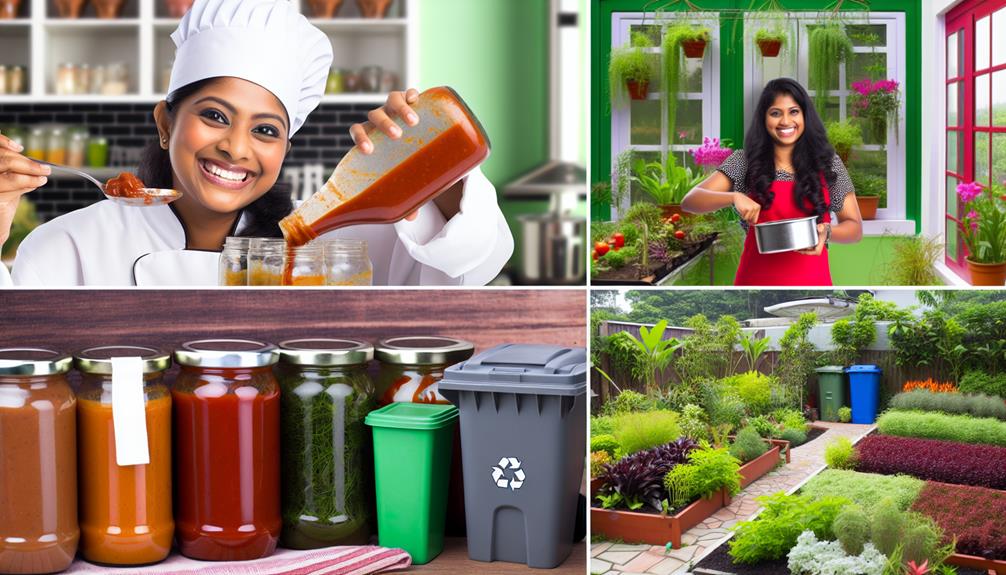

Yes, you can compost sauces, but you’ve got to be cautious. Avoid dairy and meat sauces as they attract pests and create odors. Limit oil-based sauces; balance them with green and brown materials to aid decomposition and absorb excess oil with sawdust or shredded paper.
Acidic sauces should be diluted or mixed with neutral materials to maintain pH balance. Guarantee moisture is like a wrung-out sponge, and turn your compost regularly for aeration. Use a secure bin and natural pest deterrents to avoid critters. With these steps, you’ll optimize your composting process. For more tips on efficient composting, keep exploring.
When exploring the different types of sauces, you’ll find a variety of flavors and textures suited for every dish and occasion. Knowing the different sauce varieties helps you confidently enhance your culinary creations.
Let’s start with some basic categories. There are classic French sauces like béchamel and hollandaise, which serve as foundations in many recipes. Tomato-based sauces, such as marinara and bolognese, are staples in Italian cuisine. Asian sauces, including soy sauce and hoisin, add distinct flavors to stir-fries and marinades.
Each sauce variety brings unique culinary uses to your table. For instance, creamy sauces like Alfredo pair well with pasta, providing a rich and velvety texture. On the other hand, vinegar-based sauces, like barbecue sauce, are excellent for marinating and grilling meats, adding tangy and smoky notes.
Understanding these varieties allows you to experiment and find what suits your taste. Whether you’re preparing a simple weeknight meal or hosting a dinner party, knowing how to use different sauces can elevate your dishes. By incorporating the right sauce, you create meals that not only taste great but also foster a sense of community around the table.
Also Read: Can You Compost Cadaver?
Selecting the right ingredients for your sauces not only enhances flavor but also guarantees a harmonious balance in your dishes. When considering composting sauces, it’s crucial to be mindful of the ingredients you use. Fresh herbs and spices can leave behind herb residues and spice remnants, which are excellent additions to your compost pile. These residues break down well and add nutrients to your compost.
However, you should avoid certain ingredients that might disrupt the composting process. Dairy products, oils, and large quantities of salt can be problematic. They might attract pests or create an imbalance in your compost.
Here’s a quick guide to help you:
| Ingredient Type | Compostable | Notes |
|---|---|---|
| Herb residues | Yes | Excellent for adding nutrients |
| Spice remnants | Yes | Break down easily |
| Dairy products | No | Attract pests, slow decomposition |
| Oils | No | Create imbalances, attract pests |
Keeping these considerations in mind ensures your compost remains healthy and effective. It’s all about balance. Stick to compostable ingredients and avoid those that can cause issues. By doing so, you contribute positively to your composting efforts and the environment.
Also Read: Can You Compost Cake?
Maintaining the right moisture balance in your compost is crucial for effective decomposition and nutrient cycling. When composting sauces, you need to monitor the moisture content closely, as sauces can greatly impact water retention. Too much moisture can lead to anaerobic conditions, while too little can slow down the composting process.

To achieve the best moisture balance, consider these steps:
While managing moisture levels is key, it’s equally important to address pests and critters that might be attracted to your compost pile. Sauces, especially those containing sugars or oils, can draw unwanted visitors like rodents and insects. To keep your compost healthy and critter-free, consider using natural deterrents and physical barriers.
First, natural deterrents such as peppermint oil or citrus peels can help repel pests. Simply add these items directly to the compost pile. Additionally, maintaining a balanced mixture of green and brown materials reduces strong odors that attract pests in the first place.
Physical barriers are another effective method. Enclose your compost pile with a sturdy wire mesh to prevent larger animals like rats and raccoons from gaining access. A compost bin with a secure lid also works well to keep smaller critters out. Make sure the bin has adequate ventilation to maintain oxygen flow.
Regularly turning your compost helps too, as it disrupts any nests or burrows forming inside. By combining these strategies, you can create a compost system that’s both nutrient-rich and free from unwanted pests, fostering a sense of community with nature.
Also Read: Can You Compost Candle Wax?
When composting dairy and meat sauces, you’ll face a few challenges. These sauces attract pests and rodents, slow down the decomposition process, and increase the risk of pathogens.

It’s best to avoid adding them to your compost pile to maintain a healthy and efficient composting system.
Including dairy and meat sauces in your compost can attract pests and rodents due to their strong odors and high protein content. This can be a significant issue for maintaining a healthy and efficient compost bin. Ensuring your compost remains pest-free requires proactive pest control strategies.
Here are some tips to manage this:
Did you know that adding dairy and meat sauces to your compost can noticeably slow down the decomposition process? These types of sauces introduce fats and proteins that aren’t easily broken down by the usual aerobic bacteria.
Instead, they create an environment where anaerobic bacteria thrive, leading to slower composting and unpleasant odors.
For effective composting, it’s important to maintain the right balance of materials. Dairy and meat sauces disrupt this balance, making it harder for your compost pile to reach the high temperatures required for thermal composting.
Thermal composting is essential because it accelerates decomposition and helps kill off harmful pathogens and weed seeds. When your compost pile stays cool, it can take much longer for organic matter to break down into rich, usable compost.
To keep your compost pile healthy and efficient, avoid adding dairy and meat sauces. Instead, focus on plant-based kitchen scraps, yard waste, and other compost-friendly materials.
By doing this, you’ll create an environment where aerobic bacteria can thrive, ensuring your compost breaks down quickly and efficiently, without unwanted slowdowns.
This way, you’re helping your community by maintaining a proper composting system.
Adding dairy and meat sauces to your compost not only slows decomposition but also introduces harmful pathogens that can pose serious health risks. These sauces are rich in fats and proteins, which create an ideal environment for bacterial growth. This growth can lead to pathogen contamination, making your compost a breeding ground for harmful bacteria.
To help you understand the risks better, consider the following points:
Also Read: Can You Compost Candy?
When composting oil-based sauces, you’ll need to take into account how oil breaks down in the compost pile. Oils can create environmental impact concerns by slowing the composting process and attracting pests.
To mitigate these issues, use oil absorption methods like mixing in carbon-rich materials such as sawdust or shredded paper.
In composting, breaking down oil-based sauces can be challenging but manageable with the right approach. Oil decomposition takes longer, but it offers composting oil benefits such as enriching the soil with nutrients.
To successfully compost oil-based sauces, follow these steps:
Oil-based sauces can pose significant environmental concerns if not composted properly, potentially leading to soil and water pollution. These sauces contain fats that, when decomposed improperly, can create anaerobic conditions in your compost. This can generate methane, a potent greenhouse gas, which increases your carbon footprint. To contribute positively to waste reduction, it’s important to manage oil-based sauces carefully in your composting efforts.
First, avoid adding large quantities of oil-based sauces directly to your compost pile. Instead, consider pre-treating them by mixing with absorbent materials like sawdust or shredded paper. This helps to balance the moisture content and prevents oil from creating waterlogged, anaerobic pockets.
Remember, moderation is key; small amounts are manageable, but excessive oil can disrupt the composting process.
Additionally, make sure your compost pile is well-aerated. Turn it frequently to introduce oxygen, which aids in breaking down organic matter more efficiently and reduces methane production.
To effectively manage oil-based sauces in your compost, consider using absorbent materials like sawdust or shredded paper. These materials help to soak up excess oil, reducing the risk of oil spillage and promoting a more balanced compost mix. By incorporating these absorbent options, you can avoid the issues associated with oily residues that can disrupt the composting process.
Here’s a list of effective absorption materials you can use:
Using these materials, you’ll maintain a healthier compost while responsibly managing oil-based sauces.
Also Read: Can You Compost Candy Wrapper?
Many acidic sauces, like tomato or citrus-based ones, can disrupt the delicate balance of your compost pile if not handled correctly. The high citrus content in these sauces can lower the pH balance of your compost, making it too acidic for many beneficial microorganisms to thrive. This imbalance can slow down the decomposition process and even harm your compost’s overall health.
To keep your compost pile in good shape, avoid adding large quantities of acidic sauces at once. Instead, dilute them with water or mix them with more neutral or alkaline materials, like crushed eggshells or wood ash, to help balance the pH. This will create a more hospitable environment for the decomposers that break down organic matter.
You’ll also want to monitor the pH of your compost regularly. Use a pH testing kit to make sure it stays within the ideal range of 6.0 to 7.5. If you notice the pH levels dropping, add more brown materials, such as dry leaves or cardboard, to counteract the acidity.
To achieve successful composting, it’s essential to balance green and brown materials while ensuring sufficient moisture and aeration. Green materials, like vegetable scraps, add nitrogen, while brown materials, like dry leaves, provide carbon. A balanced mix keeps your compost pile healthy and effective.
Here are four key steps to maintain an efficient compost pile:
Also Read: Can You Compost Canned Fruits?
While composting is an effective way to recycle organic waste, there are other sustainable methods you might consider. One alternative disposal method is using food waste recycling programs. Many communities offer these programs, where your food scraps, including sauces, are collected separately and processed in industrial composting facilities. This guarantees that your waste is handled efficiently and sustainably.

Another option is donating your excess sauces and food items to local food banks or shelters. These organizations often accept unopened, non-perishable sauces and can distribute them to people in need. It’s a great way to reduce waste while helping your community.
You could also try repurposing sauces in your kitchen. Use leftover sauces as bases for new dishes like soups, stews, or casseroles. This not only reduces waste but also adds variety to your meals.
Lastly, consider using a garbage disposal unit if your local waste management system supports it. Some sauces, particularly liquid ones, can be safely processed this way, but always check your local guidelines first.
You might wonder about the decomposition timeline for sauces in compost. It depends on the sauce components. Typically, they break down within a few weeks to a couple of months. You’ll feel great contributing to a greener environment!
Yes, sauces can attract unwanted animals to your compost. To maintain animal control, use compost covers. This will help you keep your compost safe and your community free from pests, fostering a sense of belonging.
Diluting sauces before adding them to your compost helps with their liquid consistency and reduces the sugar content. This prevents attracting pests and guarantees your compost community remains balanced and welcoming for all members.
Yes, there are health risks. Composting sauces can lead to microbial contamination and pathogen spread. To keep your compost safe and healthy, avoid adding sauces. Let’s all collaborate to guarantee a thriving community garden!
You can compost sauces in an indoor compost bin, but it might slow down condiment breakdown. For indoor composting, stick to small amounts, and mix them well with other compost materials to maintain balance and avoid odors.
To guarantee successful composting when wrapping up, it’s essential to consider the ingredients of the sauces you plan to compost. Balance the moisture carefully to prevent your compost from becoming soggy, and always be mindful of potential pest issues. Dairy, meat, and oil-based sauces should be added to the compost pile sparingly due to their tendency to produce odors and attract pests. Additionally, acidic sauces can impact the pH levels of the compost, so it’s wise to use them in moderation. Following proper composting techniques is key to ensuring a healthy compost pile. When in doubt, consider exploring alternatives such as directly using sauces in garden soil as a way to avoid potential composting challenges.

Don't let aphids, slugs, and caterpillars ruin another plant. Take back control with simple, natural methods that actually work.